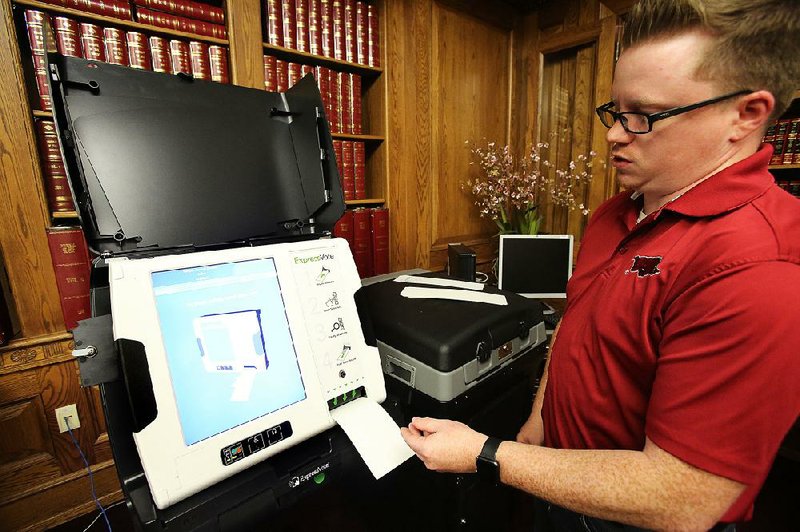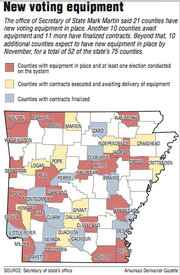The secretary of state's office believes that just over two-thirds of the state's counties will have new voting equipment by the time of the November general election.
In one of the latest developments, the office has signed contracts with 10 counties to provide new voting equipment to them with the counties and the state splitting the tab, the chief deputy in the secretary of state's office said Friday.
Chief Deputy Kelly Boyd said he expects similar contracts to be signed with 11 other counties soon, and on top of that, 10 other counties are working with the office to finalize voting equipment requirements to clear the way for signing contracts.
Twenty-one of the state's 75 counties used the new voting equipment provided by Nebraska's Election Systems & Software during the May 22 primaries, he said.
"It is my hope right now that we have 52 counties and 66 percent of the registered voters in the state capable of voting on new equipment in November, and then I don't know where it will go after that," Boyd said in an interview.
"I would love to be able to do the entire state, [but] we just don't have the money," he said. "I'm not sure every county wants to do it."
The new equipment replaces machines installed in 2006, Boyd said.
Boyd is chief deputy for term-limited Republican Secretary of State Mark Martin of Prairie Grove, whose term ends in January.
Republican Land Commissioner John Thurston of East End, Democrat and veteran election official Susan Inman of Little Rock and Libertarian Chris Olson of Viola are vying to succeed Martin in the Nov. 6 general election.
The secretary of state's office expects to spend $11.04 million for new equipment already in place, under contract or contracts under final preparation, and for the counties to spend $8.17 million toward their new voting equipment, according to figures provided by Boyd.
Boyd said he expects the secretary of state's office to receive $4.4 million in federal funds next week and use the funds to help purchase new voting equipment in other counties.
Last year, a legislative panel narrowly rejected a bill that would have transferred $18.5 million in surplus funds from the state Insurance Department's trust fund to the secretary of state's office to buy new voting equipment. The state budget administrator told lawmakers that under the law, a surplus of that trust fund would go to fund the state Revenue Stabilization Act that distributes general revenue to programs.
Boyd said the secretary of state's office required counties to split the cost of the new equipment with the state, starting last year.
The 10 counties that have signed new contracts to get new equipment include Craighead and Pope, according to the list provided by Boyd.
Craighead County's share will be $279,228, said Jennifer Clack, election coordinator for that county's Election Commission.
She said Craighead County's new equipment will include 120 Express Vote electronic machines into which a voter inserts a paper ballot and touches the screen to pick candidates. The voter then receives a paper listing his choices. The voter puts the paper into one of 30 DS200 tabulating machines for the ballot to be counted.
Craighead County also will get 52 pollbooks, Clack said. Pollbooks contain voter registration information.
"I am thrilled with this technology," she said. "This will be much simpler. It takes a lot of human error out of the equation. We will be able to get results out faster."
Boyd noted, "None of the voting equipment is connected to the Internet.
"The pollbooks are, but that's just voter registration data and that is so if you go in and vote out here you can't go over here and vote, too," he said.
The vulnerability of American voting equipment has become an issue in the past couple of years. The U.S. Senate Intelligence Committee reported in May that in at least six unidentified states, "Russian-affiliated cyber actors" conducted "malicious access attempts on voting-related websites" in the 2016 elections, according to The Associated Press. The Department of Homeland Security has said there were attempts to hack into the election systems of 21 states, but the extent of the hacking has been unclear in some cases. The federal government says there's no evidence that vote tallies were affected.
Chris Powell, a spokesman for the secretary of state's office, said the new equipment can't be hacked.
"These machines are among the latest election technology in the country. The USB media that is used is encrypted. The machines also have physical locks on them as well," he said.
The Pope County Quorum Court appropriated $191,013 for that county's share of the new equipment, said Pope County Clerk Laura McGuire.
The new equipment will include 60 Express Vote machines, 15 DS200 vote tabulators and 26 pollbooks, she said.
"I would have loved to have it in the primary [on May 22], but it didn't work out that way," McGuire said.
She said she's excited to get the new equipment.
Pulaski and Saline counties are among the counties that don't have plans to purchase new equipment in advance of the Nov. 6 election, Boyd said.
He said Pulaski County's share and the state's share would be roughly $2 million apiece.
"I hope that they [Martin's successor] can work with Pulaski County and see efficiencies," Boyd said.
"Every time we have an election, we get a better handle on what equipment is needed for an election and we have made significant reductions with some of these counties now, so maybe Pulaski County wouldn't need as much. I don't know. You vote real quickly on this new equipment. You eliminate the delays, but Pulaski County has heavy turnout, so I don't know."
Bryan Poe, election director for the Pulaski County Election Commission, said, "We definitely would like to have new voting equipment," but the last estimate would cost the county roughly $1.5 million.
"We feel confident we can make it through the next election" with the current equipment, he said.
"We'll start having discussions and see if the state can come up [with funding] since the state made the selection [of equipment] for us," said Poe.
As for Saline County, Boyd said, "We went down and [demonstrated] to their county last year and we had an agreement where it was about $1 million.
"They were going to pay $500,000 and we were going to pay $500,000 of it and I was prepared to do them, and they've backed out, so they are not getting it right now," he said.
Darlene Westbrook, election coordinator in Saline County, referred questions about Boyd's remarks to county clerk Doug Curtis. Westbrook said Curtis wouldn't be in his office until Monday.
"I think it will be nice when we get new equipment," Westbrook said.
In June 2015, Martin decided to purchase new voting equipment as part of a statewide integrated system through Election Systems & Software, although its proposal cost millions more than systems offered by two other companies.
Election Systems & Software submitted a proposal costing $29.9 million; Unisyn Voting Solutions of California submitted a bid of $24.4 million; and Hart Inter-Civic of Austin, Texas, proposed $18.7 million.
"The primary factor in the selection of ES&S was capabilities," Powell said three years ago to explain why the vendor was selected over the two competitors.
Boyd said Friday that the office has a pricing agreement with Election Systems & Software.
"I don't have to buy another piece of equipment the rest of the state's life. But if I buy it, this is the price," he said. "There's been some confusion about that. The only requirement [is the] secretary of state selects the equipment that will be purchased. The counties do not have to do this at all, but if they do, they have to purchase this equipment. That's by law and in the code."
In 2005, Martin's predecessor -- Bryant Democrat Charlie Daniels -- also purchased voting equipment through Election Systems & Software for about $15 million.
A Section on 06/02/2018


